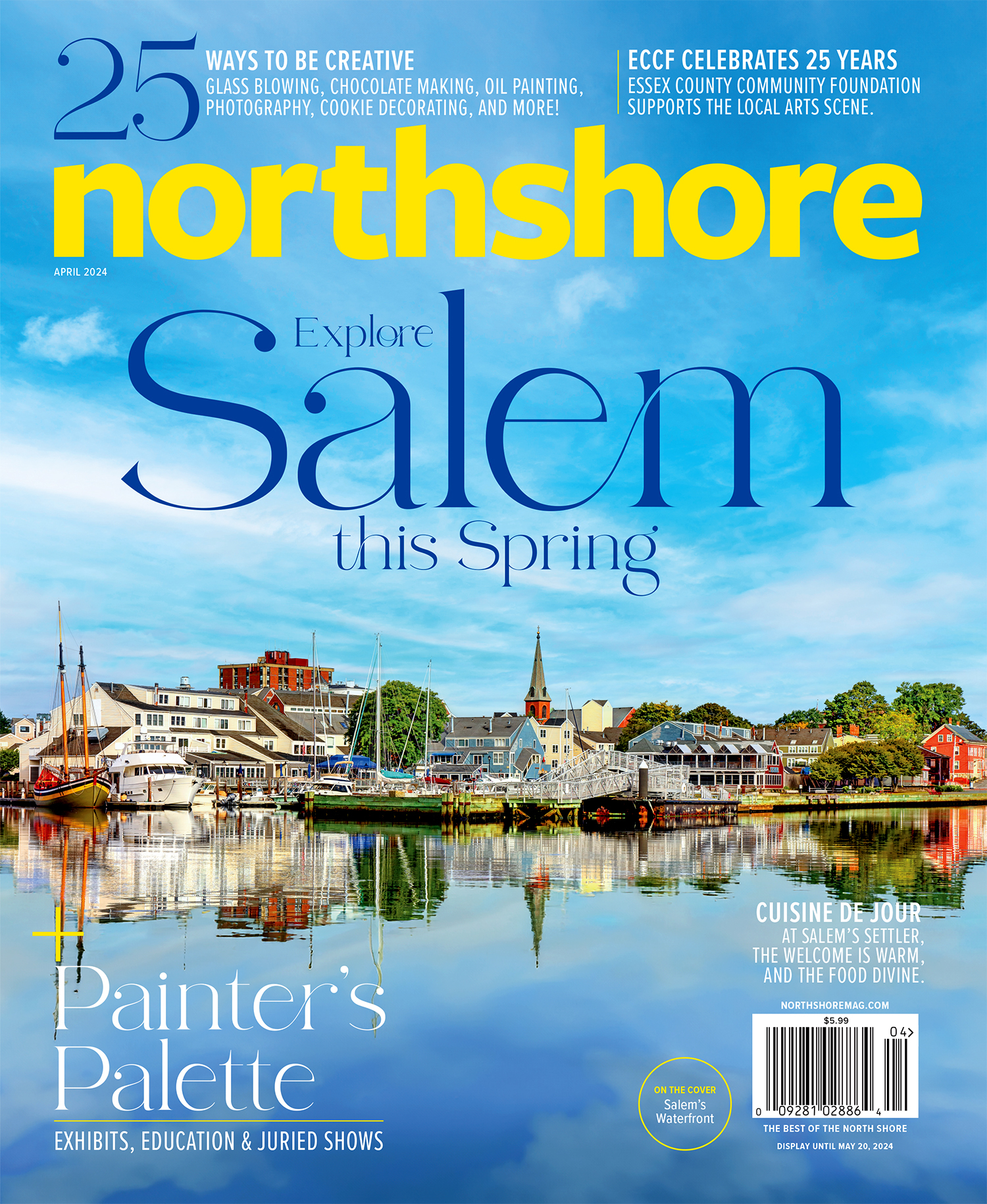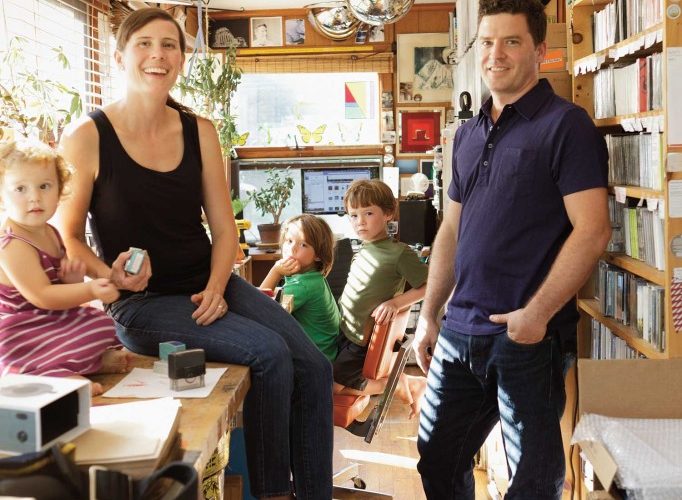From his Groveland farmhouse, John Brien-along with a close-knit team of friends and family-quietly operates an influential music label. By Jeanne O’Brien Coffey
John Brien is living proof that rumors of the demise of the record industry are premature. Since 2001-right about the time Napster was roiling labels with pirated downloads-Brien has been making a living selling music with his own independent label.
Important Records, based in Groveland, is well regarded in the music industry for its eclectic roster of off-the-beaten-path artists. As online music magazine Indieville put it, “Important has carved out a discography that reads like a who’s who of unconventional music. Simply put, if you could choose one label and listen to its releases alone for the rest of your life, Important wouldn’t be a bad place to start.”
That broad spectrum is very much by design, Brien says. “I wanted the label to be like a good record shop, where you walk in and there’s great stuff in stock in every section,” he says.
While there has been much handwringing in the past decade over the state of the record industry, Brien may have chosen exactly the right moment to launch a deeply personal independent label. “It seems like independent artists and labels are getting a lot more attention now, which is clearly how it should be,” he says. “The major label industry grew off of existing independent labels and as it retracts, it’s nice to see indies having some serious success.”
Important releases recordings from artists around the world, coordinating the manufacture of the physical format and the packaging, then shipping to distributors, record stores, and fans, from a farmhouse in Groveland where Brien lives with his wife, Jill, and three children, Henry, 7, Jonah, 5, and Helen, 2.
“Shipments come in the front door and go out the front door,” Brien says. “In the five years we’ve lived here, I’ve probably processed 150,000 units through the front hallway.”
Because Brien runs the label from a sun porch that wraps around the side of his house, and stores and ships merchandise from a barn out back the label has necessarily become a family affair, with his wife handling accounting and the negotiation of digital rights. “Over the years, I’ve been taking on more and more,” Jill says. “John has slowly come to realize that he is more interested in the creative aspects-choosing the artists, graphic design workÂ…. The day-to-day, staying on top of paying the bills, doesn’t really interest him,” she says, adding, “I like numbers and he doesn’t, I like spreadsheets and he doesn’t, so it’s worked out well.”
Other employees, like Matt “Maurice” Mellor, who handles most of the packaging and shipping, are also drawn into the family dynamic, Jill says. “Whoever [works for the label], and especially Maurice because we’ve known him so long, becomes an integral part of the family,” she says. “They are forced into spending quality time with our kids, just because of proximity.”
Especially in the height of summer, with the children home from school, the Important Records office can be a bit chaotic, Mellor admits. “I’ve been a part of this family since before the kids were here, so it’s been interesting to see them through the phases of their lives,” says Mellor, who has known the couple since college and has been working for the label full-time for about two years. “It’s good, but it’s a little hectic. Sometimes I wish it was more quiet, but I prefer it over a more typical environment.”
Since the only access to the Brien family backyard is through the office, kids stream in and out daily. “No matter how hard John tries, there is always some amount of traffic through the office,” Jill says. “And [the kids] know he’s there, so if they don’t agree with something I said, they will try to feel him out for a different opinion. If he’s doing a project and needs to concentrate, we try to make ourselves scarce, because no matter how many times I say, ‘Don’t bother Daddy,’ they’re just going to run right in there.”
Despite the disruptions, Brien thinks working from home is good for the whole family. “It’s probably a good thing that [the kids] have the opportunity to grow up in an environment where people are working hard at something they love,” he says. “I end up doing a lot of parenting when I should be working and a lot of work when I should be parenting but it all evens out in the end and my goal is to keep things as peaceful as possible for everyone involved.”
Important’s eclectic catalog means Henry, Jonah, and Helen are exposed to a lot of different music-and often the performers as well. “The kids are always fascinated by new people in the house, so if an artist or band comes to stay, there’s a good chance that they’ll leave with some drawings,” Brien says, adding that the family recently spent a lot of time with Japanese musician Kouhei Matsunaga when he visited between gigs in Boston and Brooklyn. “He spent some lazy summer days just hanging out in the backyard with the kids and watching Japanese cartoons on the Internet.”
Brien says there’s a lot of common ground between what he releases and what his kids listen to. “The nice thing about the kids is that they don’t have any preconceived notion about what music is, so they approach everything with very open minds.”
One of the many releases the whole family agreed on was from the Chicago band Cave. Brien says when Jonah was 3, he used to yell for Cave from his car seat. “If he wanted it louder, he’d demand it,” he says. “It was a family favorite, for sure.”
While there is musical common ground, the kids have more populist tastes as well-unlike his parents, who eschew digital downloads, Henry has an iPod and has downloaded music-legally, of course-with the help of his parents. Until recently, Important has intentionally stayed away from offering digital downloads. Currently about a quarter of its releases are available via iTunes, and Jill is working on making more of the catalog available digitally. “I was reluctant to do this at first, because my focus had been on physical formats for so long,” Brien says, “but I was assured many times that digital would be an alternate revenue stream and it wouldn’t replace the physical sales.”
While Brien occasionally unearths something from the hundreds of demos that cascade into his office every month, for the most part he releases music from artists he’s familiar with through seeing them live, from a recommendation, or from something they’ve released on another label.
“I’ve discovered so much incredible music in the process of running this business,” he says. “It’s a natural part of my life that has always been there-an understanding that the best music isn’t going to find you-you’ve got to search. Anyone with a curious attitude toward art and music is going to find a world of wonders in the Important catalog.”
It’s a gig Brien enjoys showing up for each day. “As the label’s reputation has grown,” he says, “so has my ability to work with the people who I want to work with,” Brien adds.
That catalog is heavy on avant-garde, early electronic, and minimalist music that Brien favors-but he says the label’s most popular sellers tend to be any music he is passionate about. “The biggest successes I’ve had have been working with artists who I have a deep love and personal respect for: Pauline Oliveros, Eliane Radigue, CC Hennix, Folke Rabe, Christina Kubisch, Duane Pitre, James Blackshaw, and so many more.”
“John does a really good job sourcing the material,” says Mellor. “I thoroughly enjoy at least 90 percent of what we release-and not just because it’s ours.” Mellor says he loves constantly listening to new music, although he admits that it’s changed his habits when he’s at home. “It used to be that I would always want to put on music at home-now when I am at home, I keep it a little quieter, because I listen to music all day. John does most of the choosing here-I never even have to lift the needle.”
That said, one of Brien’s best discoveries was actually unearthed from the demo pile by Mellor. “One day, Maurice pointed out a Grails record that was in a big pile of demos,” Brien recalls. “There’s a good chance it would have been lost in that pile never to be heard, but because he put it on and I liked it, I ended up working with them. They’ve done very, very well for Important, and I’ve become good friends with the guys in the band. If Maurice hadn’t pointed it out, Important would have missed out on so much.”
Of course, Brien is happy when one of his artists does well, but not too well, because that’s when he might lose them to a bigger label. “Early on, I was interested in finding a band and blowing them up, since it seemed like that was what labels did,” he says. “I saw the Dresden Dolls opening for my lawyer’s band and there were about 20 people watching them, but their fans were really, really excited.” They started working together, but Brien only managed to release a live CD and a 7″ before they were signed to a major label. “That was pretty much the first and last time I ever tried to blow up a band in a big way. It became clear to me that I would always lose a band to a bigger label, which has happened many times over the years.” While he rarely takes it personally, when family fave Cave signed to Drag City after releasing a full length on Important, it was disappointing. “My whole family loves Cave and it was really sad to lose them,” he says.
One unexpected revenue source has been the film industry. Important artist Kimya Dawson’s music played a major role in the film Juno. “Her career absolutely exploded after the success of the film,” Brien says. Noah Baumbach licensed a Diane Cluck song for Margot At The Wedding, starring Nicole Kidman and Jack Black, and the label just released a record with independent filmmaker Jim Jarmusch, among other brushes with Hollywood.
The success of the label has been a bit of a surprise, Jill admits. “There are moments when we look at each other and say, ‘Wow, I guess it worked.’ We still view it as a pleasant surprise – a wonderful thing that happened and is still going strong.”
As for Brien, he tries not to focus too much on the future. “I don’t feel any desire to grow Important beyond the point we’re at now. In fact, I’ve never done very much to intentionally grow the business in any way. Things seem to evolve naturally.” importantrecords.com

